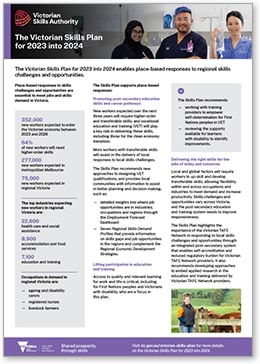This fact sheet provides summary information about the Victorian Skills Plan 2023 into 2024 specifically related to regional Victoria.
You can download a PDF copy or read an accessible version below.
Also see our other fact sheets related to the plan.
Downloadable regional Victoria fact sheet

Accessible regional Victoria fact sheet
The Victorian Skills Plan for 2023 into 2024 enables place-based responses to regional skills challenges and opportunities
Place-based responses to skills challenges and opportunities are essential to meet jobs and skills demand in Victoria.
Key statistics from the Victorian Skills Plan for 2023 into 2024
- 352,000 new workers expected to enter the Victorian economy between 2023 and 2026
- 64% of new workers will need higher-order skills
- 277,000 new workers expected in metropolitan Melbourne
- 75,000 new workers expected in regional Victoria.
The top industries expecting new workers in regional Victoria
- 22,600 health care and social assistance
- 8,900 accommodation and food services
- 7,100 education and training.
Occupations in demand in regional Victoria
- ageing and disability carers
- registered nurses
- livestock farmers.
The skills plan supports the below place-based responses.
Promoting post-secondary education skills and career pathways
New workers expected over the next three years will require higher-order and transferable skills, and vocational education and training (VET) will play a key role in delivering these skills, including those for the clean economy transition.
More workers with transferable skills will assist in the delivery of local responses to local skills challenges.
The skills plan recommends new approaches to designing VET qualifications, and provides local communities with information to assist in better planning and decision-making, such as:
- detailed insights into where job opportunities are in industries, occupations and regions
- Seven Regional Skills Demand Profiles that provide information on skills gaps and job opportunities in the regions and complement the Regional Economic Development Strategies.
Lifting participation in education and training
Access to quality and relevant learning for work and life is critical, including for First Nations peoples and Victorians with disability, who are a focus in this plan.
The skills plan recommends:
- working with training providers to empower self-determination for First Nations peoples in VET
- reviewing the supports available for learners with disability to identify improvements.
Delivering the right skills for the jobs of today and tomorrow
Local and global factors will require workers to up-skill and develop transferable skills, allowing flexibility within and across occupations and industries to meet demand and increase productivity. Skills challenges and opportunities vary across Victoria, and the post-secondary education and training system needs to improve responsiveness.
The skills plan highlights the importance of the Victorian TAFE Network in responding to local skills challenges and opportunities through an integrated post-secondary system that enables self-accreditation and reduced regulatory burden for Victorian TAFE Network providers. It also recommends developing approaches to embed applied research in the education and training delivered by Victorian TAFE Network providers.
Updated

